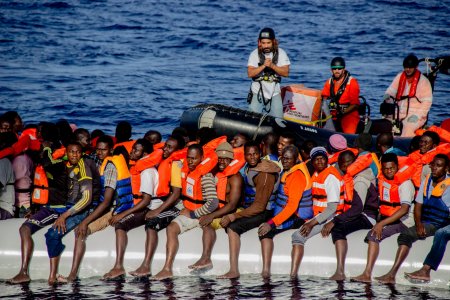NGOs are not in collusion with smugglers
Michaël Neuman & Thierry Allafort-Duverger

Director of studies at Crash / Médecins sans Frontières, Michaël Neuman graduated in Contemporary History and International Relations (University Paris-I). He joined Médecins sans Frontières in 1999 and has worked both on the ground (Balkans, Sudan, Caucasus, West Africa) and in headquarters (New York, Paris as deputy director responsible for programmes). He has also carried out research on issues of immigration and geopolitics. He is co-editor of "Humanitarian negotiations Revealed, the MSF experience" (London: Hurst and Co, 2011). He is also the co-editor of "Saving lives and staying alive. Humanitarian Security in the Age of Risk Management" (London: Hurst and Co, 2016).
Opinion column published on 29 June 2018 on Libération's website.
Over the last three weeks, and with total disregard for the lives of thousands or people, European governments have turned the Mediterranean Sea into an arena for sordid political games revolving around the closure of their borders. In the latest episode on 26th June, commenting on a rescue mission carried out by Lifeline, a ship operated by a non-governmental organisation which had been allowed in extremis to disembark in Malta, president Emmanuel Macron accused this NGO of “operating in contravention of all the rules and the Libyan coast guards” and “playing the same game as the smugglers”. He went on to say that it was unacceptable “in the name of humanitarian assistance, to bypass all controls”.
With these few words, all humanitarian aid organisations carrying out rescues at sea were made into the accomplices of human traffickers. This accusation is as absurd as it is unacceptable. NGOs only launch a sea rescue after receiving express instructions from the Italian maritime rescue coordination centre. Emmanuel Macron, like his European colleagues, also forgets to mention that non-governmental operations only rescue a minority of those saved at sea. Most are rescued by the Italian coast guards and passing merchant ships. But European leaders are telling us that rather than encourage migrants to take to the sea in perilous conditions, we should entrust responsibility for sea rescues to the Libyan coast guards - along with coastal surveillance to prevent departures. As Benjamin Grivaux, the French government’s spokesperson, was pleased to announce, “thanks to the investments [made by] France and the European Union with the Libyan authorities, the number of crossings has declined considerably”.
This decline has been obtained at an appalling cost. The Europeans in general, and the French and Italians in particular, have been encouraging the interception at sea, refoulement and detention in Libya of thousands of people who have already endured months, and in some cases years of privation, extortion, torture and slavery in this country. Nobody can claim to be unaware of this ill-treatment. Numerous reports have been published on the subject, including those based on MSF’s work in Libya, and last October CNN broadcast a video of a Libyan slave market. President Macron himself was quick to condemn the Libyan slave trade as a “crime against humanity” the following month.
Since the beginning of 2018, more than 10,000 people have been intercepted and sent back by "Libyan coast guards", a banner under which disparate groups of soldiers and armed militia are operating. These coast guards are trained and financed by the European Union, despite some of them having proven links with human traffickers. On 7 June, the UN Security Council sanctioned six people, four of them Libyan, for operating a human trafficking network - one of them was head of the Libyan coast guard in Zawiya. So, by what tragic miracle, has France - like Italy- suddenly become happy to cooperate - to collude? - with these authorities who we know mistreat migrants and sometimes even traffic them themselves.
Once returned to the detention centres, most of the people intercepted will be faced with a choice that in fact amounts to blackmail: either remain locked up in these rank cages or agree to join the “voluntary return” programme organised by the International Organisation of Migration and be sent back to your country of origin. Some people accept these proposals with relief, others only submit to them to escape the worst. A handful of them benefit from the protection of the High Commission for Refugees and are sent to Niger to await a hypothetical relocation to a European country. But they are a pitifully small minority - just under two hundred since the end of 2017- among the tens of thousands of asylum seekers in Libya. For them, nothing works: there is no registration system worth its salt and the HCR’s activities are extremely limited.
Lastly, some of the people intercepted once more fall into the clutches of criminals who lock them up in make-shift prisons and torture them in the hope of obtaining a ransom from their relatives. In fact, most of the migrants detained in Libya today are being kept in these clandestine prisons where they are treated barbarically and sometimes killed. MSF knows that hundreds of people disappear like this every month from the number of body bags it provides to a local association in the north of Libya.
So, for these people, fleeing is a necessity, not a choice. And NGOs’ sea rescue operations not only save people from drowning, they are evacuating people in situations of immediate danger.
The alternative to sea rescue is not, as Emmanual Macron and Matteo Salvini pretend to believe, to cease these operations. The alternative is to increase our capabilities for saving migrants from the hell in which they have been living so that human traffickers are not their only option. It is to abandon the policy of detention, facilitate asylum applications – accepting the fact that some people simply cannot be repatriated, and accelerate the process of re-locating them to another country, including in Europe.
I wonder what would our president’s mentor, Paul Ricoeur, think of one of his disciples accusing the ambulance driver of being the assailant’s accomplice?
 Borja Ruiz Rodriguez/MSF
Op-ed
Borja Ruiz Rodriguez/MSF
Op-ed
Humanitarian reasons versus political interests
07/11/2018 Rony BraumanHumanitarian organisations coming to the rescue of migrants in the Mediterranean Sea are kindly required either to watch them drown or to hand them over to human traffickers and torturers. We have seen countless political statements, opinion polls and editorials on the need to take a harder line against African migrants and accusing NGOs of being the accomplices of “smugglers”. We have even heard it said that these NGOs are organising the departures of those aspiring to migrate to Europe coincide with the presence of a rescue ship, making relief workers conscious actors in a criminal enterprise.
Consultations on asylum and immigration bill: MSF denounces ‘‘a fool’s game”
01/12/2018 Michaël NeumanAbstaining from participation in a meeting taking place this coming Thursday, MSF feels that "government officials have listened politely at best and shown condescension and contempt at worst in response to positions expressed in meetings, op-ed pieces published in the press and questions asked in meetings by NGOs" and do not hide "a policy that is sliding into harsh repression".
To cite this content :
Michaël Neuman, Thierry Allafort-Duverger, “NGOs are not in collusion with smugglers”, 10 juillet 2018, URL : https://msf-crash.org/en/humanitarian-actors-and-practices/ngos-are-not-collusion-smugglers
If you would like to comment on this article, you can find us on social media or contact us here:
ContributePériode
Newsletter
Subscribe to our newsletter to stay informed about our latest publications. Interested in a specific author or thematic? Subscribe to our email alerts.
